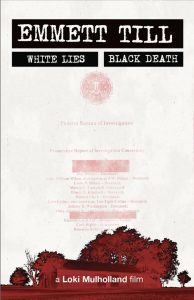 In the 20th–century South, history was distorted to fit into a segregated agenda that allowed Emmett Till’s murderers to walk away freely.
In the 20th–century South, history was distorted to fit into a segregated agenda that allowed Emmett Till’s murderers to walk away freely.
What the public once knew about the case of Emmett Till was challenged by a Joan Trumpauer Mulholland Foundation documentary, “Emmett Till: White Lies, Black Death.” The film, which showcased how an all-white jury and lies resulted in the murderers’ acquittal, was shown at the Overby Center on Oct. 9.
Assistant Professor of Journalism and moderator Michael Fagans, civil rights activist Joan Trumpauer Mulholland and producer Loki Mulholland participated in a panel after the screening.
“(Mulholland) was trying to get at the truth of Emmett Till’s story. And specifically to document as well as expose the lies that were constructed around the actual case itself and to highlight who lied, who changed the stories and who tried to hide what actually happened,” Fagans said.
Till, a 14–year–old Chicago native, spent a summer visiting relatives in Mississippi in 1955. Carolyn Bryant accused Till of whistling at her in Money, Miss., which led to his kidnapping, torture and murder by her husband, Roy Bryant, and her brother-in-law, J.W. Milam.
Investigative reporter Jerry Mitchell examined the evidence of civil rights cases to find new discoveries. Mulholland began making this documentary in 2018 during Mitchell’s nationwide pursuit to uncover the truths about Till’s case.
The documentary features individuals who had met Till and those who were involved with the trial in which Bryant and Milam were acquitted. All but one of these interviews took place in the state of Mississippi.
“Many did not want to participate (in interviews), but you want the truth to be told,” Mulholland said. “Some will tell the wrong story with the right information available.”
Senior journalism major Caleb Harris said the film’s visuals brought a new light to Till’s unjust story.
“I believe the cinematography was very effective. One of the shots in the movie showed the river Till was thrown into as the narrator was mentioning Till’s body being found,” Harris said. “Little details like that really brought the story to life.”
However, others felt that while the film is valuable, it lacked necessary representation.
Following the panel, Fagans expressed that the documentary fell short by not featuring Black interviewees.
“I think one of the other takeaways, sadly, was that representation and voices matter, and I felt the Black community was ignored in this,” Fagans said. “I felt that it was very white-centric.”
Audience members shared the same concern, as the story of Till has always been told from a white perspective. Till’s mother, Mamie Till-Mobley, famously acted as her son’s advocate in hopes that his story would never be forgotten. Her voice was not present in the documentary.
“I felt like the documentary shed a lot of light on the story of Emmett Till that has been overlooked in the past,” Layton Lawhead, a senior journalism major, said. “The question and answer session at the end of the screening was very intense, and many people in the audience questioned why there were no people of color in the film. Overall, I thought it was a well produced story; however, I wish there had been more diversity in the cast.”
Editor’s Note: Caleb Harris is a sports writer for The Daily Mississippian.



























